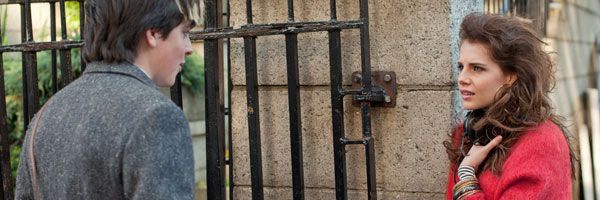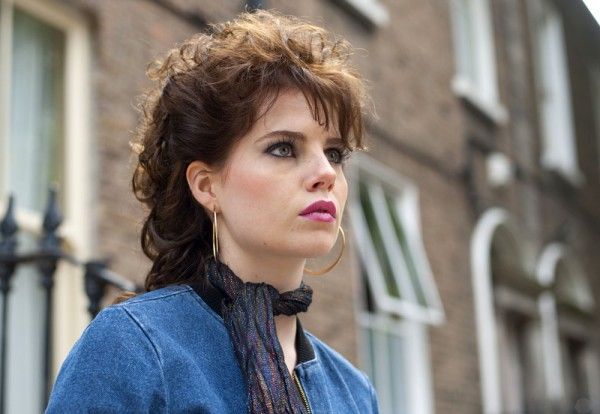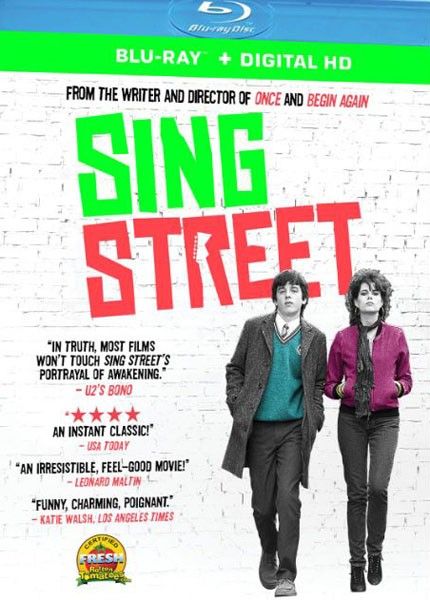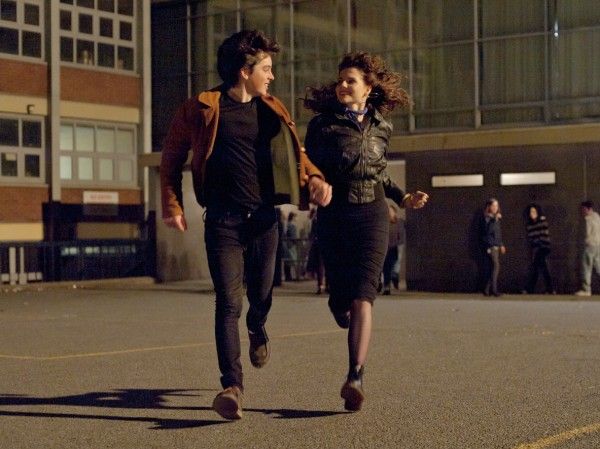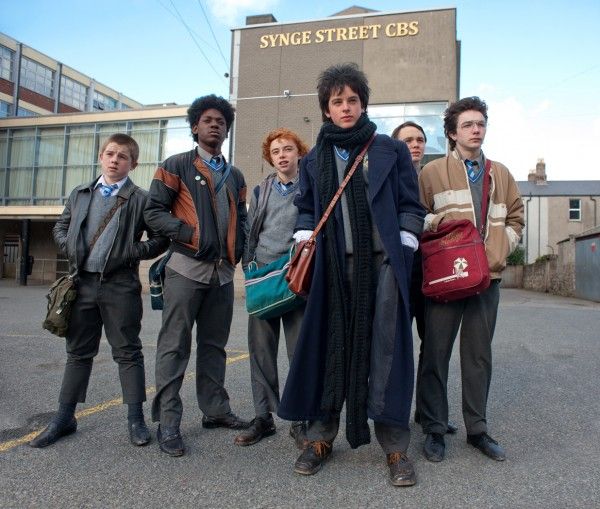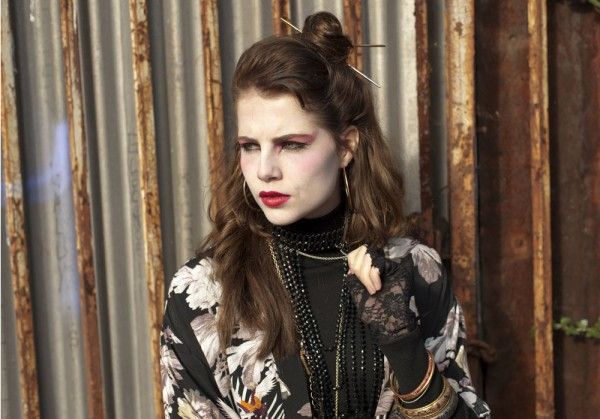Sing Street, one of the best and most inspiring films of 2016, is now available on Blu-ray/DVD with bonus behind the scenes and making of content. From writer/director John Carney (Begin Again, Once), the story is seen through the eyes of Conor (Ferdia Walsh-Peelo), a 14-year-old in 1980s Dublin, who is looking for a break from his strained family life and finds a glimmer of hope in the enigmatic Raphina (Lucy Boynton). In an attempt to win her heart, he invites her to star in his band’s music videos, but then must quickly form that band and pour his emotions into writing lyrics, all while learning there is much more to her than initially meets the eye.
During this exclusive phone interview with Collider, actress Lucy Boynton talked about why Sing Street was a project that stood out to her, the audition process she went through, what made Raphina such a unique character, and her favorite memory of the shoot. She also talked about playing the second wife of J.D. Salinger, opposite Nicholas Hoult, in Rebel in the Rye from writer/director Danny Strong, what she looks for in a project, and how much she enjoys losing herself in a character.
Collider: This is such a great, fun, inspiring movie. Did you know how special Sing Street was when you first read it, or did it take seeing the finished film and then hearing how people were reacting and responding to it?
LUCY BOYNTON: It was one of those scripts that stood out. It’s so rare that you come across a character like this in a film, let alone such a tremendous collection of characters. Often, you find that there’s the protagonist and they’re surrounded by a lot of prop characters who support the protagonist’s story and move on. With John Carney’s characters, no matter how long they’re in a film and whether it’s one scene or every scene, you really feel like you’re dropping into their lives and you see a much bigger picture. It was such a unique script. And the way that it’s packaged as a comedy, which is how it was sent to me by my agent, like John’s other films, it’s so much more than that. Anyone who’s seen it can understand that it’s so much more than a comedy. The comedic or light moments are so accentuated because of the darker moments and the more poignant points of each character. Because you have that contrast of light and dark, and highs and lows, you feel each of them so much more intensely.
This Blu-ray includes the cast auditions. What was your audition process like for this, and would you personally prefer those things never get seen by people?
BOYNTON: Yes! Oh, my god, I dread them surfacing. The audition process was fairly long. It started at the beginning of summer, with sending in a self-tape and then getting notes back from John. They said I looked a bit too old, so I dressed down as much as I could, and then I got a note back that said I looked too innocent. I was going through some kind of identity crisis, trying to prove to him that I could play Raphina. And my accent in those audition tapes is definitely questionable.
Raphina is the muse that starts Conor on his journey, but there’s so much more to her than that. Do you think you would have been as interested in this role, if all of those elements to her weren’t there?
BOYNTON: All of the elements that make up Raphina are what makes her such a unique character, and also so uniquely written. With all of John Carney’s characters, there’s so much to them. And the way that the script was written, there was just so much to them. You can’t really have Raphina without all of the elements that John wrote in. Yes, she is the muse character, in a way, but only because she has put herself there. With everything that she has gone through in her life, at that young age, the way that she’s learned to survive is to keep people at a certain proximity and present herself with this facade of confidence of, “I’m great and I’m going places.” That aura of confidence is presented with her huge hair, bright make-up and colorful clothes, so she forces herself into that position of muse. But then, as you see in the film, she’s so much more than that. Usually, that is enough for most people. Most people see that and that’s all. Whereas Conor, because he is this very young, pure thing, he looks for the purity in other people, so he looks further with Raphina and he stays. He’s really the first person to do that with her, so he’s able to reach through that and reach past that, and see past that, which definitely makes her very uncomfortable, but brings her back to life, in a way.
We learn that there’s so much more to her and about her, throughout the film. What do you think became of Raphina, after we leave her?
BOYNTON: At the end of filming, John came up to Ferdia [Walsh-Peelo] and said, “What do you guys think? Do you think they make it?” I was like, “I have to believe they make it. They do.” And he just looked at me and went, “Idiot!” I was like, “Oh, god, no!” There’s definitely a variation of ways that you can see the end. I definitely think, because of who they are, they go on to have huge futures. But the main focus is just the fact that they go and they do leave, against all the odds. They just keep going and just keep pushing on. I think that is a theme that runs throughout the entirety of the film. Everyone has these rough edges and flaws, but there’s no sense of self-pity. They just keep going.
They say that all rock stars want to be actors, and all actors want to be rock stars, but have you ever had your own fantasy or dream of becoming a rock star and have you thought of the type of band you’d want to have?
BOYNTON: Oh, my god, I would be the most uncool band member, ever. I’m not as cool as Raphina. My dream would be to be like Tina Weymouth from Talking Heads. Her style and everything about her, she’s just the coolest human being. I would hope to be like her, but would probably end up being some dreadful nerd who sounds like a drowning cat. And Paul McCartney has always been the love of my life.
Do you have a favorite memory or moment from Sing Street that will always be the one you think of, when you think of the time you spent making the movie?
BOYNTON: The very last day of filming, we were doing the final scene of the movie, in the boat. It was done partly on a blue screen, but we actually did a lot of that scene out on the water, in a storm, which was awful. We had to pick it up, when the ferry comes, on a blue screen. It was the last day of filming, so there was this end of school feeling. It was one of the most physically challenging scenes of the film, but there was definitely this sense of this amazing scene coming to an end, where you suddenly got a moment to step back and look at everyone that you’ve been living with for the last two months. It was one of those dreadful moments of realizing that you were living everyone for however many years until the movie came out. But, I also had a moment of realizing how special the whole thing was and how special this film would be.
Do you know what you’re going to be doing next, or are you working on anything right now?
BOYNTON: I finished filming Rebel in the Rye in May, which is about J.D. Salinger. That’s written and directed by Danny Strong, who is another total genius. I cannot believe how lucky I am to be working with all of these people. And that is just a brilliant script. I’m really excited for that one, which I think will come out sometime next year. And I have another movie, called The Blackcoat’s Daughter, which comes out in September. That was written and directed by Osgood Perkins, and is with Emma Roberts and Kiernan Shipka. It's a horror film that's all blood and guts. That’s a really, really brilliant script that’s a lot more about human experience than just horror. I’m really, really proud of that one.
Who is Claire Douglas, the character you’re playing, to J.D. Salinger, and what was it like to bring her to life opposite Nicholas Hoult?
BOYNTON: Nic Hoult is just such a brilliant actor. It was hard because Claire Douglas and J.D. Salinger’s relationship was a bit of a roller coaster. The way that it tracks in the film shows you them being totally in love as young people, and then the disintegration of it as they get older. After she had children, he very much lost interest in her. By the end of their relationship, when they were divorcing, he has moved across the street. He was the kind of guy that lived in the bunker at the end of the garden, and then moved across the street and left her with the two children. It was absolutely brutal. It was poignant and sad to go from the very happy in love couple to the disintegration. Oddly enough, we actually filmed it in complete reverse. My first day on set with Nic was just screaming at him. And then, the last scene we filmed was at 2am on this balcony in New York city, overlooking the Cathedral, which was all lit up, and it was a balmy night. It was the scene where they meet, and it couldn’t have been more beautiful and more romantic. I think it’s going to turn out really, really beautiful, especially the way that Danny has written and directed it. He is a total genius.
Actors only have a limited amount of control over their career, as far as the projects they get to do, but how do you decide what you’ll do next?
BOYNTON: It’s definitely the contrast that excites me. Over the course of my career, I want to play everyone from everywhere, in every kind of world. That’s the most exciting thing about this career. When you do a period piece, it’s like a behind the scenes history lesson because you’re not just learning the facts of the time, but you’re completely enveloping yourself in that era, right down to the costume and the locations. So, I’d love to do any project that is the furthest departure from my own experience in my own life. But ultimately, it is just down to the character, the script and the director. It’s the contrast, but also the journey that I’ll be able to go on with that character. But, it’s not really any one particular genre that pulls me. It’s just the character.
You’ve talked about how you fell into acting, but that you realized it’s what you were meant to do. Was there a moment that really helped you to realize that?
BOYNTON: When I was 10 years old, I was in normal school and we had this new drama teacher, and she was an actress herself. All the other drama teachers we’d had, had been the science teacher doubling as a drama teacher because no one really took it that seriously at school. But then, we had this actress and she introduced it, not as playing pretend, but as an exploration of people, how they work and why, and how they react and why. She presented it as a very valid thing to do, and as an extension of psychology and sociology. So, we did a play of The Lion, The Witch and The Wardrobe, and she cast me as Lucy, which was definitely an upgrade from playing the third sheep, a month before. I was thrilled. She introduced concepts like acting with your eyes, which especially for camera work is the most crucial thing. A camera can pick up a blink, and that can be the most significant moment that’s the turning point in the scene. I loved that exploration of having that control over your body and knowing that the camera can read your thoughts, in a way, while you’re going through the thought process of the character. It is all thanks to [that drama teacher] that I’m doing what I am now. It just seemed like the most fascinating and intricate exploration.
Do you prefer getting to lose yourself in a character’s look and visual style, and maybe even use an accent, or do you also enjoy getting to play character that look, sound and feel more like you?
BOYNTON: I definitely am more excited when a character is very different to myself, and that is also what is most intimidating about approaching a role. Raphina is definitely the furthest that I’ve gone from myself. Naturally, you’re inclined to try to empathize on a level that you understand, relating your own experiences to theirs, as a means for understanding them. But it’s also much more interesting when you can’t because the character is furthest away. That is definitely something that I would like to pursue, throughout my career. I want to get further and further away from myself, and then explore that. I’d love to play some kind of serial killer, who’s a 1950s housewife serial killer.
Sing Street is available on Blu-ray/DVD.

